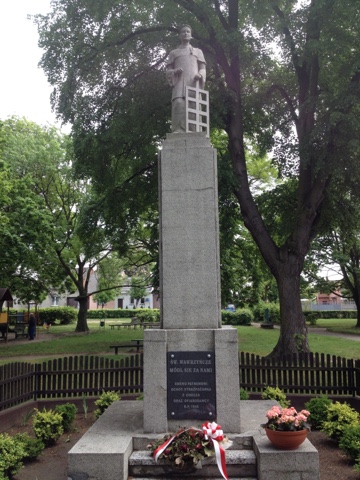"Old" Europe etiquette is slow and patient. Pedestrians trump everything so there is quite a bit of waiting while they cross the street. It's a good pause that gives a new-to-Europe gringo driver time to contemplate the meanings of the many unfamiliar signs.
"New" Europe is fast and furious. Always keep one eyeball on the cars from behind that are moving 60 to 80 kilometers faster than you and don't even think about passing unless you can get it done quickly.
Our trip from Czech Republic to Poland was a mix of the two Europes. Exciting and sometimes dull but beautiful nonetheless as we drove though the rain some 500 kilometers to the small town of Chocz.
One of our main destinations was the village of Chocz, where my (Alaine) great grandfather (and others) were born or had connections.
In the village of Chocz, Wielkopolskie (then part of
Russia)--perhaps or along the few roads that one can use to reach the small
berg, there was born a baby boy, christianed Franciszek. It was an October day,
the 10th, in 1883. He was, perhaps, an only child to Michal and his
young second bride, Anna. She, a Balicka, was daughter to Michel (Balicki)
and Julianna (Ostalewicz), also from Chocz. Anna’s husband, Michal Borgiasz,
was born of Tomasz Borgiasz and Zuzanna Zielinska in 1855. All were from Chocz,
though Anna’s parents were both deceased by the time she was 20, perhaps
earlier.
Michal Borgiasz and his siblings Josef, Marianna and
Wiktoria, were also all born in Chocz, though Wiktoria was the only one to
survive past infancy (Josef) and adolescence (Marianna) and to marry and have a
child of her own. It’s possible that Franciszek (Francis, Frank) knew of his
aunt Wiktoria and her husband, Stanislaw Skorupski, and their child, Wiktor, 13
or so years Franciszek’s senior, as they
all had ties to Chocz. Francis likely also knew his half-sister, Hipolit, born
to his father and his first wife, Michalina Garbowicz, who died, it may be, in
childbirth just two years before Francis was born. What happened to Hipolit? Did she also die in
childbirth? I wonder if Francis, Frank, and she shared some childhood.
The marriage of Franciszek’s parents , widower Michal, a day
laborer of twenty-six years, to twenty-year-old Anna, was officiated by Fr.
Ignazy Woszczalski of the parish church in Chocz in January 1883. There’s good
reason to believe his parents were there, or alive, at the wedding. But Anna’s
parents were not, both having deceased. In addition to one Jan Kowalewski
witnessing the marriage, Konstancy Ostalewicz, Anna’s guardian—at 48 years perhaps
he was a maternal uncle –was witness.
And Frank, what did he do in or near Chocz until he met his
bride, Maryann Staszak? She, his
close-equal in age, was born in the even smaller village (more a crossroads) of
Adamowo in the parish of Budzislaw Koscienlny. For some reason, it seems the
two, Frank and Maryann, chose to live near her
family home instead of his and moved at some point to Adamowo where Maryann
gave birth to her eldest Adam Jan in 1903 and his brother Stefan in 1907. It
was these two who accompanied MaryAnn from Adamowo to New York in 1911, a year
after Franciszek arrived in New York.
Once in the States, they made their way to Chicago—were there other
family to greet them?—and had Yanina in 1912, William in 1916 and Irene in 1918
or 1920.
It was getting late and we hadn't arrange a place to stay--or even know if there would be a place to stay--but both the GPS and maps.me app pointed us to Agroturystyka Mirabelka, about 6k outside of town. Arriving at the closed gate and not knowing if they were open or if they would take a late reservation Alaine stepped out of the car, walked up to the intercom and in her best phonetic Polish said, "No Polska. Angleskoo? Pookoey?"
Fortunately, the the woman who answered came out, opened the gate and spoke perfect English. She showed us to a building separate from her home. Inside it was quite comfortable and modern. There was a small kitchen and separate bar that we could use, and a dining/game room with big screen tv, foosball and pool table. Upstairs, the bedroom and bathroom were super nice euro-modern. She said it would be one hundred zloty.
How much is one hundred zloty? We had no idea and were feeling tired, hungry and lucky to have found a place to sleep let alone sleep in such luxury. We took the deal. It wouldn't be until later--once we found out that the price also included high-speed internet--that we were able to look up the conversion rate. $28!
J.P.--Gotta love the Polish Pope!
Another small town where distants originated.
Alaine's grandfather, Adam Borgijasz, is shown to have been born in Adamowo. There is more than one of such name, but this crossroads of a "town" is in the near vicinity of Chocz and Mieczownica.
Adamowo
Adamowo
Upstairs here it seems a great aunt of my father's, Fulgenzia Splawski, lived. Her son, in Chicago in .... sent her $40.
Goodnight, Poland.
































No comments:
Post a Comment
We'd love to hear your questions and thoughts!